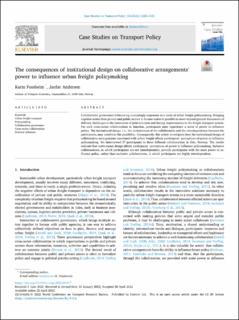| dc.contributor.author | Fossheim, Karin | |
| dc.contributor.author | Andersen, Jardar | |
| dc.coverage.spatial | Norway, Oslo | en_US |
| dc.date.accessioned | 2023-06-19T10:40:38Z | |
| dc.date.available | 2023-06-19T10:40:38Z | |
| dc.date.created | 2022-04-26T13:53:43Z | |
| dc.date.issued | 2022-04-22 | |
| dc.identifier.citation | Case Studies on Transport Policy. 2022, 10 (2), 1325-1331. | en_US |
| dc.identifier.issn | 2213-624X | |
| dc.identifier.uri | https://hdl.handle.net/11250/3072035 | |
| dc.description | Karin Fossheim, Jardar Andersen, The consequences of institutional design on collaborative arrangements’ power to influence urban freight policymaking, Case Studies on Transport Policy, Volume 10, Issue 2, 2022, Pages 1325-1331, ISSN 2213-624X, https://doi.org/10.1016/j.cstp.2022.04.017 (https://www.sciencedirect.com/science/article/pii/S2213624X2200092X) | en_US |
| dc.description.abstract | Collaborative governance is becoming increasingly important as a mode of urban freight policymaking. Bringing together actors from private and public sectors in forums makes it possible to move beyond general discussions of delivery challenges to the innovation of joint solutions and lasting improvements to the freight transport system. For such cross-sector collaborations to function, participants must experience a sense of power to influence policy. The institutional design, i.e., the inclusiveness of the collaboration and the interdependence between the participants, may condition this possibility. Consequently, this article investigates how the institutional design of collaborative arrangements associated with urban freight affects participants’ perceptions of power to influence policymaking. We interviewed 37 participants in three different collaborations in Oslo, Norway. The results indicate that institutional design affects participants’ perceptions of power to influence policymaking. Inclusive collaborations, in which participants are not interdependent, provide participants with the most power to influence policy, rather than exclusive collaborations, in which participants are highly interdependent. | en_US |
| dc.description.abstract | The consequences of institutional design on collaborative arrangements’ power to influence urban freight policymaking | en_US |
| dc.language.iso | eng | en_US |
| dc.publisher | Elsevier | en_US |
| dc.rights | Navngivelse 4.0 Internasjonal | * |
| dc.rights.uri | http://creativecommons.org/licenses/by/4.0/deed.no | * |
| dc.subject | Urban freight transport | en_US |
| dc.subject | Policymaking | en_US |
| dc.subject | Collaborative governance | en_US |
| dc.subject | Cross-sector collaboration | en_US |
| dc.subject | Political influence | en_US |
| dc.title | The consequences of institutional design on collaborative arrangements’ power to influence urban freight policymaking | en_US |
| dc.title.alternative | The consequences of institutional design on collaborative arrangements’ power to influence urban freight policymaking | en_US |
| dc.type | Journal article | en_US |
| dc.type | Peer reviewed | en_US |
| dc.rights.holder | © 2022 World Conference on Transport Research Society. Published by Elsevier Ltd. | en_US |
| dc.description.version | publishedVersion | en_US |
| cristin.ispublished | true | |
| cristin.fulltext | original | |
| cristin.qualitycode | 1 | |
| dc.identifier.doi | 10.1016/j.cstp.2022.04.017 | |
| dc.identifier.cristin | 2019201 | |
| dc.source.journal | Case Studies on Transport Policy | en_US |
| dc.source.volume | 10 | en_US |
| dc.source.issue | 2 | en_US |
| dc.source.pagenumber | 1325-1331 | en_US |
| dc.relation.project | Norges forskningsråd: 283332 | en_US |

